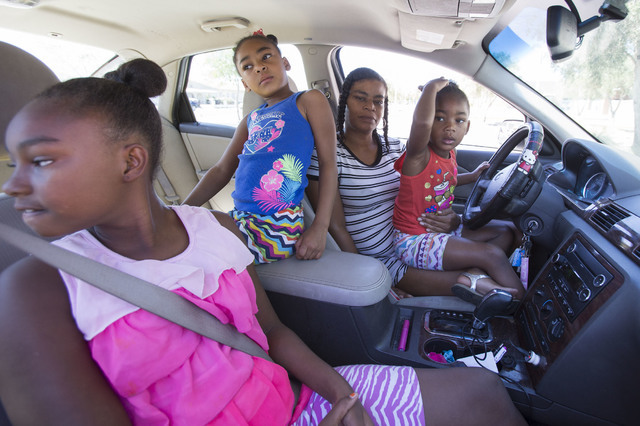Trying to stay positive while living in poverty

In counselor Beverly Spikes’ office at Wendell Williams Elementary School, there are signs everywhere she wants visitors to take to heart.
“Your attitude determines your altitude,” reads a poster from NASA, the nation’s space agency.
“Life is not waiting for the storm to pass, it’s about dancing in the rain,” reads another from author Vivian Greene.
Positive. Relentlessly positive. It’s what principal Cynthia Ireland, Spikes and teachers at the school try to be each and every day.
“We want the kids to believe that that they can be whatever they want to be, that it’s up to them,” said Spikes, who noted that four years ago the school was honored nationally for making significant academic improvement.
Given the challenges of the children who attend the school at J Street and Washington Avenue — more than 90 percent grow up in poverty — if these students believe they can shape their own positive destiny, it certainly shows that when the going gets tough, the tough get going.
These aren’t children who had control over the fact that the best meals they’ll eat are the ones provided by government-funded breakfast and lunch programs. Nor did they choose to grow up where dope dealers are commonplace.
They certainly don’t ask parents to move them from one school to another, putting them behind in their studies. A third of enrolled students at Williams leave before year’s end; low-income families struggle to find housing.
And students like Erica Conner’s 7-year-old daughter, Carviona, don’t ask for a bedroom located in the same car she rides to school, a 2009 Ford Taurus she frequently shares with her mother and sisters Carvia, 11, and Carvah, 4.
Conner, who gets therapy for depression, showed me the car where the family often sleeps. While Carviona and younger sister Carvah seemed happy, Carvia, now in middle school, wasn’t.
“It’s uncomfortable to sleep in the car,” she said.
“I take the car to a better neighborhood when we sleep in the car,” Conner said. “I’m doing the best I can for my kids.”
Raised in 22 foster homes in California after her parents ran into trouble with the law, Conner said she tries to be positive.
“I want my kids to have a good chance at life, to get a good education,” she said. “But it’s hard to be positive when you’re struggling to be alive.”
She works as a caregiver for elderly people around town but doesn’t make much more than her $375 a month car note.
“We can’t lose the car because then I wouldn’t be able to get to work,” she said. ” I’ve had other jobs, but my dyslexia and anxiety and depression cost me jobs.”
Conner had her first child — he’s now 19 — while in high school.
“The guy said he’d take care of me, help me finish school and we’d be a family,” she said. “He lied.”
Conner now gets $600 monthly in food stamps. When her father, who lives in a small apartment, lets her and her children live there, she cooks there. Other people often let her cook for her kids at their places, sometimes letting her and the kids sleep on the floor.
Not long ago, she said she and her children were living in a shelter but were thrown out after she developed a toothache.
“I had pain so I got something on the street, and they thought I was doing drugs and kicked us out,” she said.
Conner’s three girls all come from a father who left the family.
“People wonder why I kept having children,” she said. “When you’re basically an orphan you want a family, somebody to love, somebody who loves you. Why can’t I have love in my life? If we had a place to live, we’d be fine.”
Students need to see those signs in the counseling office.
“We’re fortunate young kids are resilient,” said Spikes, pointing out that a couple of other children at the school are considered homeless. “It breaks my heart to see what they go through. But right now Carviona seems happy.”
Paul Harasim’s column runs Sunday, Tuesday and Friday in the Nevada section and Monday in the Health section. Contact him at pharasim@reviewjournal.com or 702-387-5273. Follow @paulharasim on Twitter.